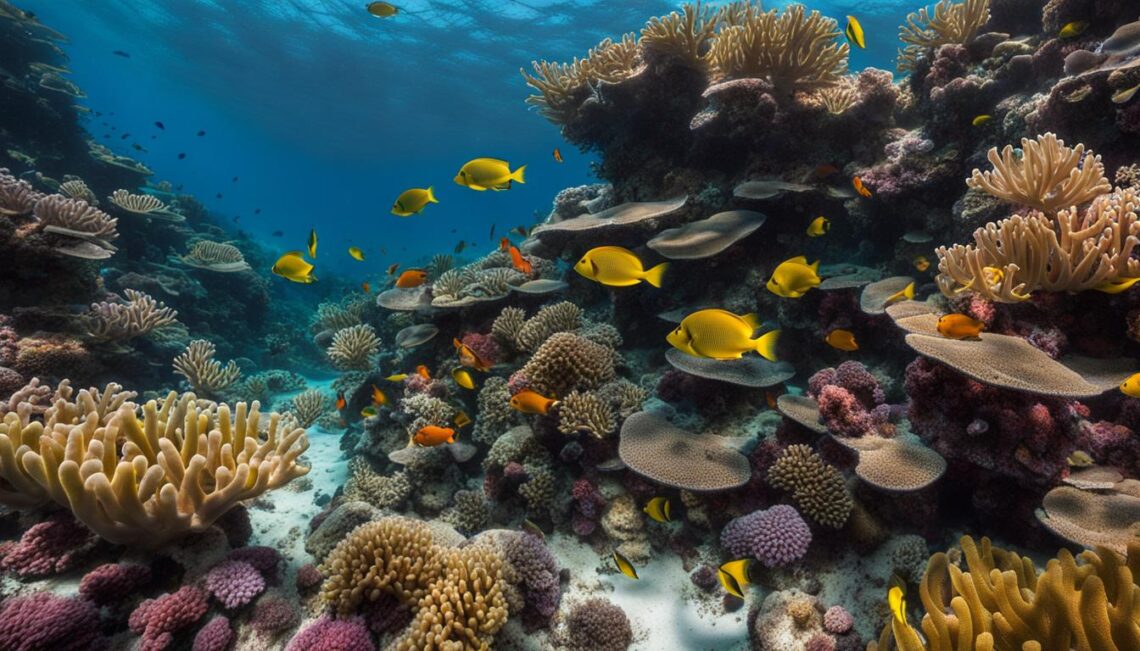The Maldives, an archipelago of over 1,000 coral islands in the Indian Ocean, is a breathtaking destination known for its crystal-clear waters, white sand beaches, and luxurious resorts. However, it’s the Maldivian coral reefs that truly showcase the untamed beauty and rich biodiversity of this paradise on Earth.
The Maldivian coral reefs are unique due to their exceptional health and diversity, with over 250 species of coral and 1,000 species of fish thriving within the ecosystem. Unaffected by mass tourism, these coral reefs remain largely untouched, preserving the underwater world in all its glory.
Exploring the Underwater Paradise
The Maldives boasts of some of the world’s most spectacular dive sites and snorkeling spots that offer an unparalleled experience of marine life. With crystal clear waters, colorful reefs, and abundant marine creatures, exploring the underwater paradise of the Maldives is a must-do activity for any nature enthusiast.
Dive enthusiasts can discover a wide range of dive sites, including the famous Banana Reef, Fish Head, and Maaya Thila, each offering its unique charm and marine life. For those who want to snorkel, the Maldives has plenty of shallow reefs that can be easily accessed, where snorkelers can spot colorful fishes such as triggerfish, parrotfish, and clownfish, to name a few.
Snorkeling in the Maldives: A Spectacular Underwater Adventure
Snorkeling in the Maldives is a fantastic experience that doesn’t require any special training or equipment. The Maldives has numerous snorkeling sites, and some of the best ones include:
- Fish Head
- Biyadoo Reef
- Bodumohoraa Thila
Snorkelers can witness the abundant marine life, including colorful schools of fish, turtles, reef sharks, and other exciting sea creatures. With the crystal-clear waters and high visibility, snorkeling in the Maldives is a must-do activity.
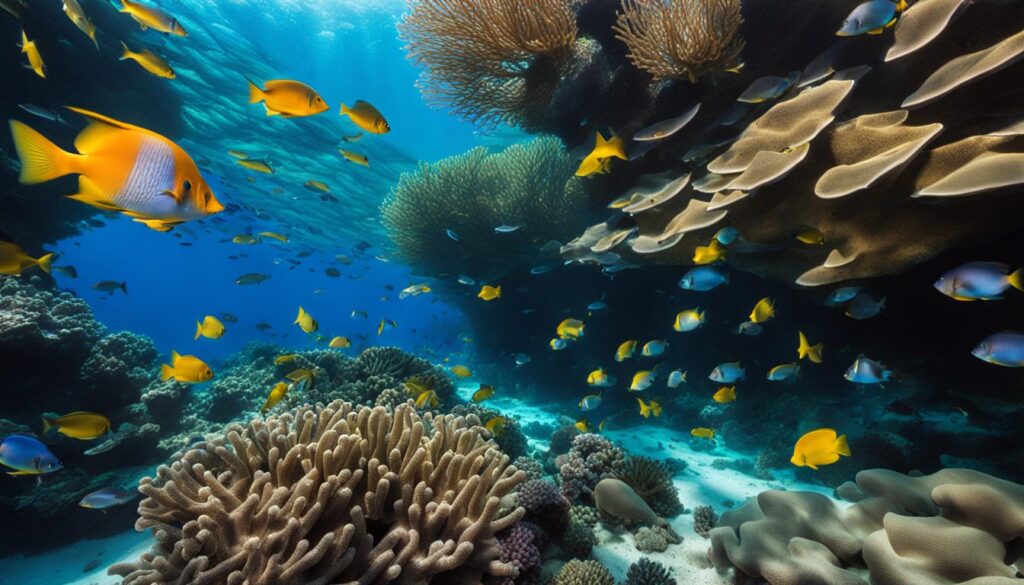
The Biodiversity of Maldivian Coral Reefs
The Maldives is home to some of the most diverse coral reefs in the world, boasting a rich marine life that flourishes within its underwater ecosystem. The coral reefs in the Maldives are home to a vast variety of species, including rare and endangered ones, that call these reefs home.
Turtles, whale sharks, rays, reef sharks, Napoleon wrasses, eagle rays, and grey reef sharks are just some of the many species of marine animals that can be found around the Maldivian coral reefs. These reef systems also offer habitat and protection for an abundance of smaller creatures such as crustaceans, mollusks, and various types of fish.
Maldivian coral reefs and their biodiversity play an essential role not only in the underwater ecosystem but also in the Maldive’s cultural heritage. Many of the local Maldivians are historically fisherman and have depended on these coral reefs for their livelihood and food source for generations. In addition, the coral reefs are integral in attracting tourists from around the world, seeking to explore the underwater beauty of the Maldives.
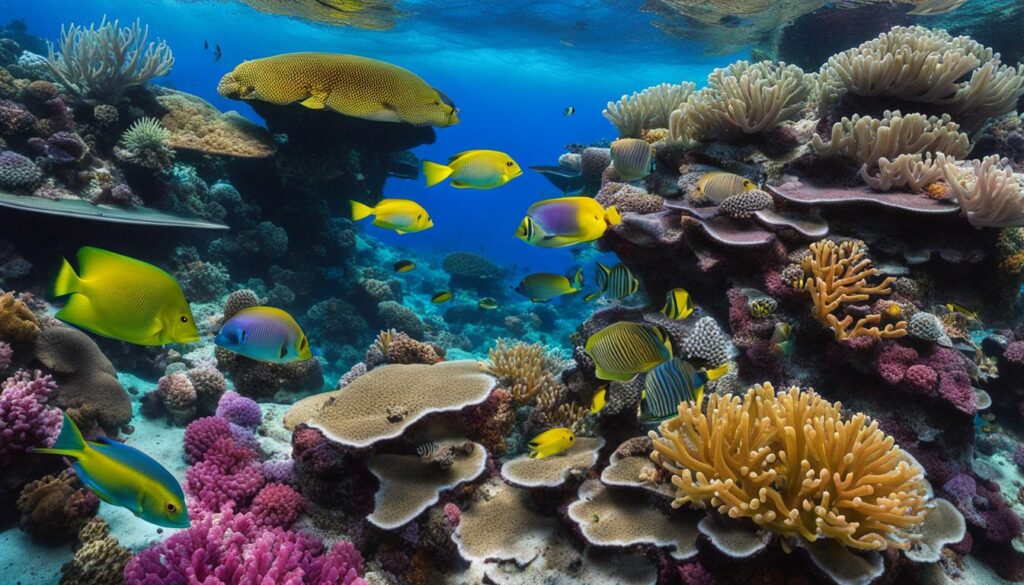
Sadly, climate change, pollution, overfishing and other human activities have negatively impacted the coral reefs in the Maldives and threaten the biodiversity found within. Coral reef conservation programs have been implemented by the Maldivian government and other organizations as a means of combating these issues. One such organization is the Maldives Coral Institute whose primary focus is coral reef conservation.
Preserving Biodiversity in the Maldivian Coral Reefs
The Maldivian government and conservation organizations are actively working to preserve the biodiversity of the Maldivian coral reefs, essential for the underwater ecosystem’s health and longevity. They implement sustainable fishing practices, protect fish breeding grounds, and ban destructive fishing techniques like dynamite fishing to safeguard the coral reefs and their biodiversity.
Additionally, the active introduction of eco-friendly tourism practices is crucial in protecting these delicate ecosystems. Tour operators are educating tourists on the importance of responsible behavior around the reefs, thereby fostering sustainable tourism practices. These efforts not only help preserve but also accentuate the beauty and biodiversity of the Maldivian coral reefs.
Capturing the Untamed Beauty through Underwater Photography
Maldives underwater photography offers an exceptional opportunity for capturing the stunning beauty of the coral reefs. The crystal clear waters, vibrant colors, and dynamic marine life make for breathtaking shots that are sure to leave a lasting impression.
Photographers can capture the unique shapes and textures of the coral formations and fascinating marine species like green sea turtles, whale sharks, and manta rays. Underwater photography in the Maldives is not just restricted to professionals, but even novices can take part in guided underwater photography tours or attend workshops organized by experienced photographers.
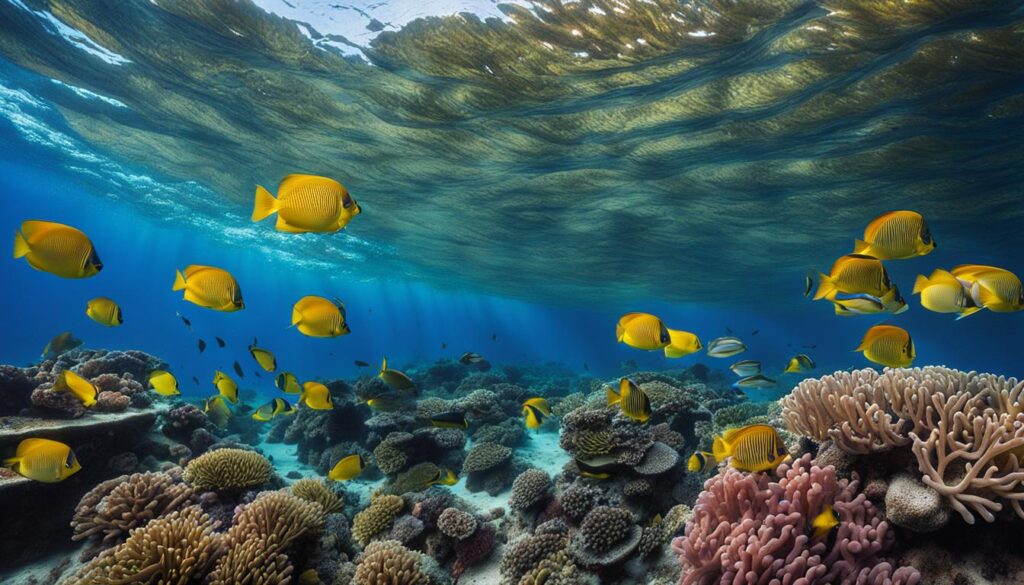
The Maldives’ underwater photography opportunities absolutely dazzle, making it a must-visit destination for photography enthusiasts worldwide.
Exploring the Best Dive Sites in the Maldives
One of the top reasons tourists visit the Maldives is for its incredible dive sites. Here, we will highlight some of the best locations for divers to explore the underwater world.
North Male Atoll
The North Male Atoll is a popular spot due to its proximity to the capital city of Male. This area offers a variety of dive sites, from easy to challenging, suitable for all levels of divers. These sites are home to an abundance of colorful fish, stunning coral formations, and even the opportunity to spot large marine species like sharks and rays.
Manta Point
Manta Point is another must-visit dive site in the Maldives. As the name suggests, this spot is known for its regular sightings of majestic manta rays. Divers can also witness other large pelagic species, including whale sharks.
Ari Atoll
The Ari Atoll stands as a lesser-known yet equally mesmerizing diving area in the Maldives. It features a diverse range of coral formations, from soft to hard corals, and hosts rich marine life, including nudibranchs, crustaceans, and schools of colorful fish.
Regardless of your diving experience level, the Maldives provides an unforgettable and immersive underwater experience. Don’t miss the chance to explore some of the world’s best dive sites.
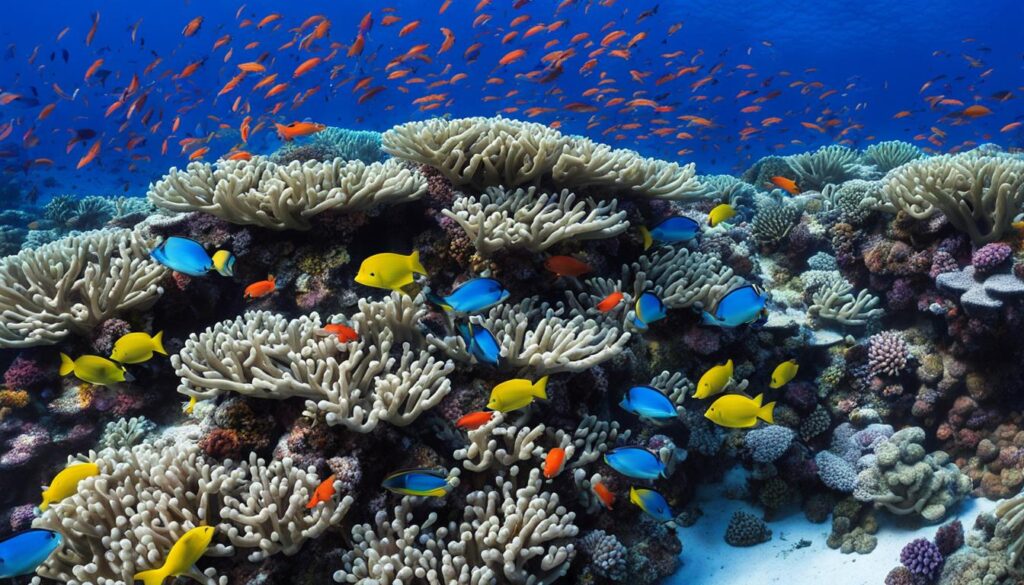
Snorkeling in the Maldives: A Spectacular Underwater Adventure
Visitors find snorkeling in the Maldives a thrilling adventure that allows them to explore the breathtaking marine life up close. The crystal-clear waters and abundant coral reefs of the Maldives offer a memorable experience to snorkelers at all skill levels. Furthermore, the Maldives’ top snorkeling sites are famous for their incredible biodiversity and vibrant underwater landscapes.
At the Banana Reef in North Male Atoll, for example, visitors spot colorful fish and rare species like the Napoleon wrasse. Meanwhile, the Maaya Thila in South Ari Atoll presents nocturnal marine life, providing an abundance of awe-inspiring sites for exploration and making every dive a unique encounter with the underwater world.
With so many snorkeling spots to choose from, visitors are sure to find one that suits their preferences. Whether it’s a solo adventure or a guided tour, snorkeling in the Maldives promises a spectacular time.
Sustainable Tourism in the Maldives
The Maldives, celebrated for its spectacular coral reefs and marine life, stands as a leading global tourist hotspot. Yet, the surge in tourism threatens these fragile ecosystems. To address this, the introduction of sustainable tourism practices aims to safeguard the coral reefs of the Maldives.
Choosing eco-friendly resorts is one method to endorse sustainable tourism. These resorts give precedence to environmental conservation through practices like recycling and cutting down on water and energy usage.
Responsible diving practices constitute another facet of sustainable tourism. Irresponsible diving can damage coral reefs. By adhering to guidelines such as avoiding contact with or harm to the reefs, refraining from feeding marine life, and not using sunscreen with harmful chemicals, tourists can play a part in the conservation of coral reefs.
Ways Tourists Can Support Coral Reef Conservation:
- Choose eco-friendly resorts.
- Follow responsible diving practices.
- Participate in coral conservation efforts, such as beach cleanups.
- Support local conservation organizations.
By practicing sustainable tourism, tourists can support the preservation of the Maldivian coral reefs and ensure they remain untouched for future generations. Let’s protect these natural wonders so that they continue to thrive for years to come.
Conclusion
The Maldives’ coral reefs, with their stunning beauty and diverse ecosystem, are vital to preserve for future generations. Their vibrant corals and rare marine species make this an underwater paradise, highlighting the need for sustainable tourism and conservation. Activities like snorkeling and diving offer unforgettable encounters with this natural wonder, emphasizing the importance of protecting these crucial ecosystems. The vivid coral reefs and rich marine life underline the Maldives’ significance to global biodiversity.
The Maldivian coral reefs are known for their untamed beauty and vibrant marine life. These reefs boast a diverse ecosystem with a wide variety of coral species, colorful fish, and other marine creatures.
Where are the best dive sites in the Maldives?
The best dive sites in the Maldives are found in several locations, with the North Male Atoll, South Ari Atoll, and Baa Atoll being some of the most popular. These sites provide divers with unique underwater landscapes and a rich abundance of marine life.
What can I expect to see when snorkeling in the Maldives?
Snorkeling in the Maldives is an incredible experience. You can expect to see vibrant coral formations, schools of colorful fish, graceful sea turtles, and even majestic manta rays. The marine life in the Maldives is truly mesmerizing.
How is sustainable tourism promoted in the Maldives?
The Maldives is committed to sustainable tourism practices. Many resorts and dive centers in the Maldives have implemented eco-friendly initiatives, such as waste management systems and renewable energy sources. Additionally, tourists are encouraged to choose responsible diving operators and support local conservation projects.

